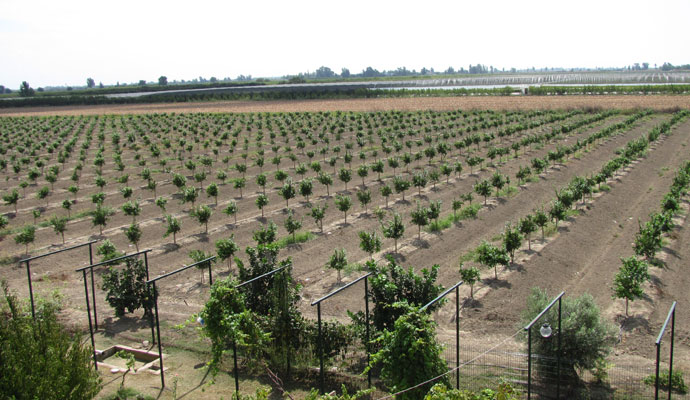Xalıd Şêxo, a manager of the Center for the Economy of Social Development in Dirbêsiyê, says
“The aim of our co-operatives is to prevent internal and external powers from sowing seeds of division between the peoples.”
Following the 19 July revolution in Rojava, there has not only been developments of a military nature. There are new developments in more or less every domain of life. While reconstruction works are underway in the cantons of Rojava, which are under attack from gangs such as ISIS, al-Nusra Front and Ahrar ash-Sham, there have also been changes in the agricultural and economic areas.
The institutions of autonomous governance are removing the rich and poor divides by organising commune and co-operative activities. The economy of social development organises activities in both the commercial and the agricultural domains.
The ANF went to the Center for the Economy of Social Development in the town of Dirbêsiyê, part of the Cizîr [Jazira] canton, to gather information and conduct an interview with Xalıd Şêxo, a manager of the Center.
“Although the activities of the co-operatives have not reached the quality that we desire, we are continuing to make efforts. We’ve accelerated our work with the First Economic Conference and the ‘Edî bes e koçberti’ move,” said Şêxo, adding that their economic and agricultural work had had positive results in the year of 2015.
Remarking that the agricultural and commercial co-operatives have 300 members, Şêxo said
“The aim of our co-operatives is to prevent internal and external powers from sowing seeds of division between the peoples. We can say that we have thwarted such plans by helping the development of co-operatives. We have come together from diverse communities and faiths in the co-operative and opened large areas to agriculture. By developing co-operatives we have removed the rich and divide. This is actually the essential aim and importance of co-operatives.”
‘The membership cost is used to improve and expand co-operatives’
Şêxo highlighted that the co-operatives involve people from different communities and faiths, along with landowners and the landless, the poor and the rich. He further explained:
“The membership cost for the kooperatives is 15 thousand Syrian lira. However, we have also included people without income and unable to pay this price. The money we receive is used to improve and further expand co-operatives, and we have also embarked on some projects. For example, one of the projects is a water manufacturing center. The brand of the water manufactured here wil be ‘ROJ AV’. Machinery with the latest technology has been purchased for this facility. We are aiming to produce 100.000 m2 of water daily. Bottled water will also be produced. We are predicting a monthly revenue of 150 million Syrian lira. This revenue will generate 840 thousand Syrian lira for each member of the co-operative.”
‘We are planning to overcome unemployment’
Şêxo underlined that with the foundation of the Center, they plan to overcome unemployment, saying:
“Those that want to become members of the agricultural and commercial co-operatives can contribute based on their ability to pay and become members. We apply positive discrimination for those without material members and grant them membership.”
Stating that the approximate population of Dirbêsiyê, with the town center and surrounding villages, is a 100 hundred thousand, Şêxo added that a section of this population participates in the co-operatives.
Şêxo said “Our co-operative work in Dirbêsiyê improves every day towards the level we want”, and added that the products will be shared with the community, and their purpose is to remain in their own lands and stem emigration.
Şêxo informed that the commercial co-operative has 3631 members, and the membership price is 15 thousand Syrian lira, while 2038 people have joined the agricultural co-operative and, 52 of which are not in good financial standing. At the moment, 39.611 decares of land have been cultivated.
Şêxo further remarked that communes have been set up in the villages Jidede and Fewira, saying that
“There are about 55-60 people in these two villages. Barley, lentil, wheat, sesame and similar crops are being cultivated. Around 6,500 decares of land have been harvested. 70% of the revenue will be directed to the communal chest, and villagers will receive their income from here. The main purpose of the communes is to help our people, improve their living standards, and provide more care for those in bad economic situations. The people of Dirbêsiyê have always taken part in the Kurdish freedom movement and continue to do so. These gains have not been made without sacrifice. They have been achieved thanks to our martyrs and our organisation. We have started with this cause, and we will carry on.”

